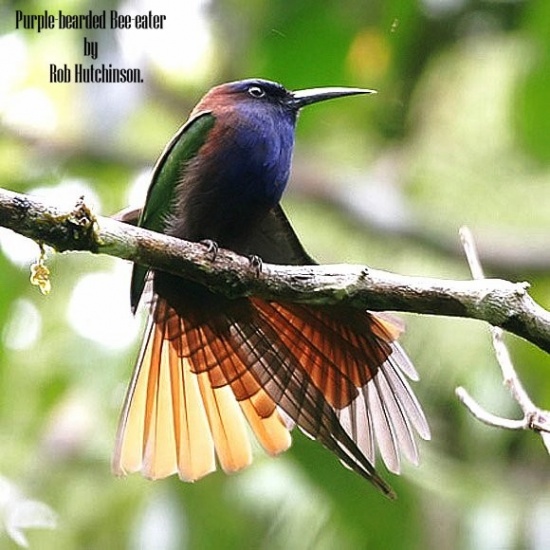| Line 5: | Line 5: | ||
==Identification== | ==Identification== | ||
| − | 25-26 cm (10 inches) long, plus 6 cm (21/2 inches) of tail streamers. | + | 25-26 cm (10 inches) long, plus 6 cm (21/2 inches) of tail streamers. |
| + | |||
| + | *head, face, breast and upperbelly purple | ||
| + | *throat with long hanging feathers (the "beard") | ||
| + | *nape red-brown | ||
| + | *upperparts, wings and upper tail are green | ||
| + | *tail long | ||
| + | *bill long, downturned, black | ||
| + | *call is a quiet high-pitched ''szit'' or ''peep'' | ||
| + | Female is similar with a red-brown belly. | ||
| + | Juveniles have a green crown and nape, blue beard and dusky face. They do not have the long tail feathers. | ||
| + | |||
==Distribution== | ==Distribution== | ||
[[Sulawesi]] endemic. South East Asia: [[Indonesia]]: [[Greater Sundas]]. | [[Sulawesi]] endemic. South East Asia: [[Indonesia]]: [[Greater Sundas]]. | ||
Revision as of 12:16, 11 July 2023
Alternative name: Celebes Bee-eater
- Meropogon forsteni
Identification
25-26 cm (10 inches) long, plus 6 cm (21/2 inches) of tail streamers.
- head, face, breast and upperbelly purple
- throat with long hanging feathers (the "beard")
- nape red-brown
- upperparts, wings and upper tail are green
- tail long
- bill long, downturned, black
- call is a quiet high-pitched szit or peep
Female is similar with a red-brown belly. Juveniles have a green crown and nape, blue beard and dusky face. They do not have the long tail feathers.
Distribution
Sulawesi endemic. South East Asia: Indonesia: Greater Sundas.
Taxonomy
The Purple-bearded Bee-eater is a near passerine bird in the bee-eater family Meropidae. It's the only member of the genus Meropogon. Its scientific name commemorates Eltio Alegondas Forsten (1811-1843) who collected in the East Indies between 1838 and his death.
Habitat
Dense forest.
Behaviour
This bird breeds inland during the dry season and moves to the coast in the rainy season. It makes its nests in burrows in riverbanks and cliffs. It does not form colonies. The diet includes insects, including bees, wasps and dragonflies and beetles, which are caught in flight.
External Links
GSearch checked for 2020 platform.1




